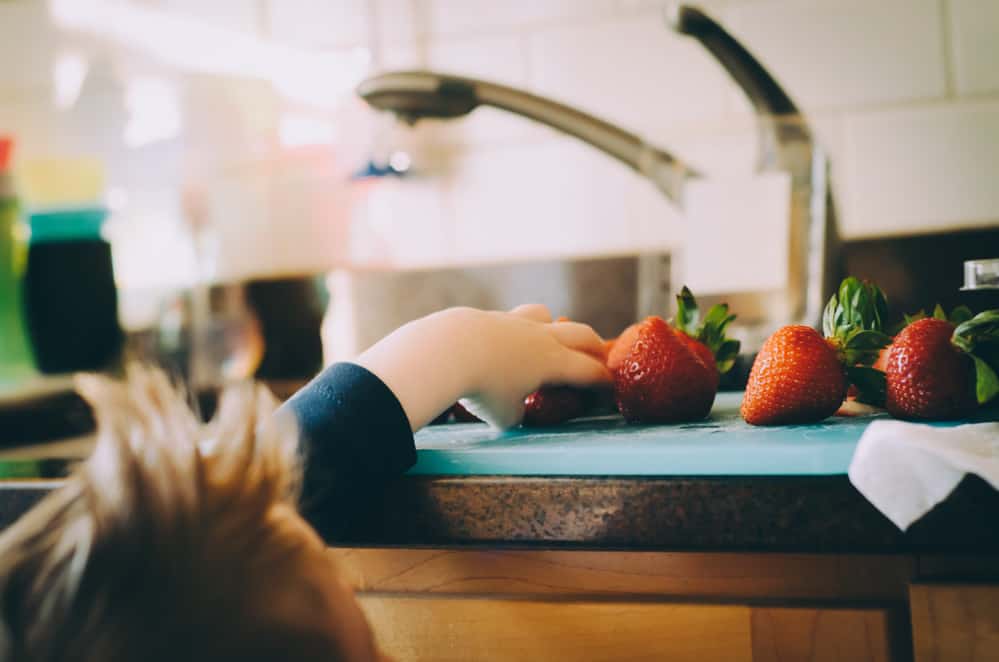Getting kids in the kitchen and teaching them to cook real foods is the best way to create healthy habits, grow healthy adults, and foster independence.
What would you do if you won the lottery?
Other than pay off your house?
I always said I’d call up Michelle and figure out how to help get better food in schools. That may seem odd considering I don’t even have kids.
But what kids eat affects how kids learn and the kind of healthy habits they’ll maintain when they are older. Kids that learn healthy relationships with food and cooking become self-sustaining healthy adults. That eventually impacts our overall economy, health insurance, and taxes via Medicare and Medicaid
We all need to care about our society’s collective health.
Why not start with the next generation?
When I was a kid I was lucky, though I didn’t know it then. I had home-made breakfasts and dinners and Mom always packed lunch that was filled with actual food. At the time, Lunchables and cafeteria pizza were popular and I always thought I was missing out on the “perfect” toy-like food.
Turns out, I was forming good habits and getting nourished while my classmates were building bad habits, sugar additions, and possibly the foundations of disease.
March is National Nutrition Month, and what better way to spread healthy eating habits than teaching the next generation. If we want kids to eat healthier, why not teach them to cook for themselves?
Here’s Daniel of Dad Solo to tell us about the safe way to teach kids to cook, and why you should do it.

Photo by Kelly Sikkema on Unsplash
Benefits of Cooking for Kids
When you have children, you want to do everything in your power to ensure they are prepared for the world ahead of them. There are many lessons you pass down to them: how to tie their shoes, how to brush their teeth, how to stick up for themselves… But perhaps one of the most important things you can teach your kids is how to find their way around the kitchen.
Teaching your children how to cook provides ample bonding time for your family. It keeps their little hands busy while providing you with an opportunity to talk. Cooking provides a nice balance between activity and relaxation that encourages kids to open up and ask questions, as well.
Cooking also helps children build confidence. Knowing they are helping the family during an essential part of the day helps them feel like a part of the team.
Plus, every meal is a small success you can enjoy together.
Furthermore, cooking helps your child develop their math, science, and reading skills. It doesn’t hurt that they get a good amount of practice following directions, as well.
Setting the Foundation for a Healthy Future
But perhaps most importantly, getting your children involved in the kitchen teaches them a healthy life skill they can carry with them for the rest of their lives.
According to a 2017 survey, 90% of Americans say they don’t like to cook. Constantly getting takeout or eating in restaurants can be expensive and potentially financially irresponsible. Furthermore, eating out adds excess calories, salt, sugar, and fat to your diet. You have less control over the ingredients and can end up eating more processed and refined foods.
Eating that way constantly is a pretty good explanation behind the one in three Americans that are overweight in this country. You are probably well versed in the health risks of being overweight, but just in case you need a refresher, it increases a person’s chances of developing: Heart disease, Type 2 diabetes, High blood pressure, Stroke, Sleep apnea, Osteoarthritis, Fatty liver disease, Kidney disease, Certain kinds of cancer

Photo by Jason Rosewell on Unsplash
Kids Safety in the Kitchen
While it’s a great idea to involve your children in the meal making process, there’s no denying that the kitchen is one of the most dangerous rooms in the house. Sharp utensils, hot surfaces, and risks of contamination are all around you.
However, you can and SHOULD teach your children to cook and keep themselves safe. THey’ll need those skills eventually and it’s awkward if they have to wait and make their college roommates teach them. Believe it or not, kids generally have pretty good instincts when it comes to avoiding danger.
With your guidance, making a meal should be no problem whatsoever. However, if you’d like a little guidance, just follow these rules.
- Start small, with stirring and mixing and slowly expand into cutting and heat elements.
- While your kids are learning to cook, they should have adult supervision. They should also always listen to directions given by adults. Every parent knows their child best and will know when they are old enough to go solo.
- Help prevent fires by regularly testing your smoke detectors and never leaving the kitchen unattended when cooking. Keep a fire extinguisher under your sink where you can easily access it in case of a fire.
- Teach your kids the importance of washing your hands after handling raw meats or cleaning products. The best way to teach is by example.
- Never put oil or water in a hot pan or pot. It can cause it to react and splash back, burning your skin.
- Keep paper towels and dish rags away from the stove where they can catch fire.
- Thoroughly rinse fruit and vegetables before preparing or eating.
- Always use oven mitts to pick up hot pots, pans, or baking sheets.
- When handling sharp objects, use proper knife safety protocol.
- Clean up the kitchen as you go. This has the added bonus of teaching them how to clean up after themselves.
Teaching your children how to cook is a great way to bond and foster their independence. It also teaches them a useful skill they can carry with them for the rest of their lives. To keep them safe, always monitor kids in the kitchen. Teaching them how to cook safely will ensure it remains a pleasant activity they will cherish.

Photo by Hannah Tasker on Unsplash








